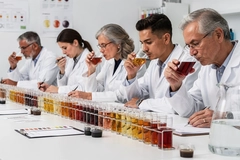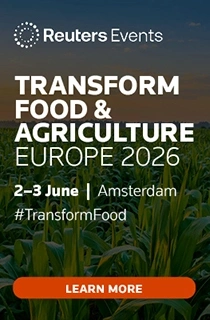
- Industry news
Industry news
- Category news
Category news
- Reports
- Key trends
- Multimedia
- Journal
- Events
- Suppliers
- Home
- Industry news
Industry news
- Category news
Category news
- Reports
- Key trends
- Multimedia
- Events
- Suppliers
Microsoft and Danone join forces to usher in next-generation of AI-powered regenerative agriculture companies

16 Jan 2020 --- Jointly supported by Microsoft and Danone, a third class of the start-up company support program AI Factory For AgriFood has kicked off – fueling the synergies of regenerative agriculture and artificial intelligence (AI) technology in food chains. The aim of the three-month program is to accelerate the digital transformation of the sector and support these young businesses to continue their development in AI and cloud computing. The announcement of the six selected start-ups will be formalized on March 5.
“At Danone, we believe that AI can contribute to the food revolution by improving our agricultural systems and our food’s value chains. That’s why we are happy to launch this program with our partners at Microsoft. In a fundamental area such as food and agriculture, it is essential to encourage collaborative initiatives, knowledge sharing and the emergence of new, more inclusive and more sustainable solutions,” says Cécile Cabanis, Executive Vice President and Chief Financial Officer, IS/IT, Cycles and Procurement at Danone.
Start-up applicants of the AI Factory for Agrifood are required to have developed and marketed a solution based on an AI-powered technology and intended for professionals in the food industry. In addition, applicants need to have already raised capital to fund their business operations.
This program aims at being a co-innovation laboratory that links start-ups with the world of research and various players in each sector. Thanks to these synergies, the AI Factory for Agrifood intends to encourage projects serving regenerative agriculture (soil health, animal welfare and support for farmers), sustainable food, waste minimization and supply chain optimization.
The AI Factory for Agrifood start-ups will benefit from Danone’s “One Planet. One Health” vision, which links human health and the planet’s across its entire value chain. The program outlines that companies will also benefit from “access to real use cases under demanding real life conditions of quality and performance.”
Meanwhile, Microsoft will provide personalized support through its technological skills and the services of its Azure platform, as well as its sales network. French national research institute in digital sciences Inria, alongside France Digitale, FaberNovel, EIT Food and Seventure Partners are also teaming up with Microsoft and Danone and to intervene during the different stages of the program: AI start-ups sourcing, selection process and coaching, among others.
“Our ambition is to help develop digital intelligence for healthy food and sustainable agriculture. This partnership with Danone will provide selected applicants with in-depth expertise and personalized support, thus accelerating innovation throughout the agrifood sector,” concludes Agnès Van de Walle, Director of the One Commercial Partner Entity at Microsoft France.
AI-powered food of the future
AI is increasingly making waves in the burgeoning space of food tech supporting human, animal and planetary health. Earlier this month, German start-up company Spacenus unveiled its Agricultural Nutrient Assistant (ANA), which evaluates satellite images to calculate the current nutrient supply of cultivated plants. This provides information on the supply of plants with the nutrients nitrogen, phosphorus, potassium, sulfur and magnesium.
In December, British distiller Diageo spearheaded a new AI and machine learning system, coined What’s Your Whiskey, to analyze people’s flavor preferences in alcohol and match them with their “perfect whiskey.
Also within the whisky space, an artificial “tongue” that can “taste” subtle differences between drams of whiskey has been developed to help cut down on the trade in counterfeit alcohol. In a paper published in the Royal Society of Chemistry’s journal Nanoscale, Scottish engineers describe how they built the tiny taster, which exploits the optical properties of gold and aluminium to test samples of whiskey.
Dairy giant Arla Foods currently utilizes AI in its 3D imagery systems to identify changes in physical wellbeing, mobility and weight in cows. The use of visual monitoring and data recording in conjunction with to assist in managing cow welfare is said to remove human subjectivity from health screening assessments.
Arla Foods has additionally developed an AI tool to better predict its milk intake from farms. According to the company, 200 million kilos of milk can now be utilized more efficiently each year, through predictions of how much milk 1.5 million cows will produce in the future, elevating value chain sustainability.
Last November, Kerry Group and IBM launched a predictive AI tool to forecast future trends in food and beverage and guide the development of winning consumer-preferred products. Kerry Trendspotter taps into large scale unstructured data to understand consumer behavior and anticipate future consumer needs.
By Benjamin Ferrer










